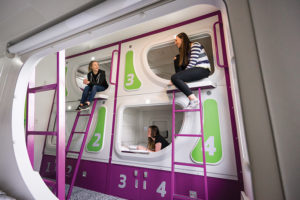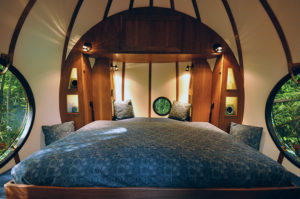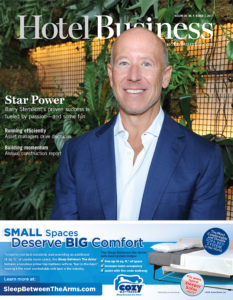INTERNATIONAL REPORT—The concept of a pod hotel—a property that offers the room necessities in a very small, or pod-like, space—is not a new development in the industry. In fact, the first pod, or capsule, hotel opened in Osaka, Japan, in 1979. The Capsule Inn, which proudly announces this distinction on its homepage, offers a small pod for sleeping, which includes temperature controls, a TV, radio, light and sprinkler system. Valuables are kept in lockers and guests can use the bathroom and shower in the changing room.
Since then, pod hotels have popped up all over the world, in various shapes and sizes, and with various amenities.
In the United States, specifically in New York and Washington, DC, the pod hotel experience is not hard to find. The Pod Hotels brand, owned by New York-based BD Hotels, currently has two locations in Manhattan and another in Washington, DC. Managing Director David Bernstein noted that expansion plans are underway.
“In May, we will be opening Pod Williamsburg in Brooklyn, and probably in late July-early August, we’ll be opening Pod Times Square,” he said, adding that at the latter, “We are experimenting with Pod Pads—small apartments you can rent on a monthly basis.”
He noted that a Los Angeles Pod Hotel should break ground sometime this year. “We have to work out some things with the city, but construction should start within the next six months,” he said, adding the brand is currently in conversations with three other cities.
“We offer a clean, modern room and very competitive rates. What differentiates us from everybody else is the social aspect of our hotel, whereby we try to get guests to interact with each other,” Bernstein said. “We don’t do any in-room services. We want you out of your room and meeting other guests and the staff. We want you to have a good time and not just offer you a place to stay.”
He noted that there are advantages and disadvantages to owning and operating a pod hotel. “For owners, on a per-key basis, you are in for a lesser amount, so you can have a lower rate,” said Bernstein. “You are really taking advantage of every square foot.”
He continued, “On the flip side, you are packing a lot of equipment into a small space. There’s a lot of wiring and pipes [to get in there], so it can be a delicate balance.”

A Jucy Snooze room with four pods offers families a clean, safe and affordable way to travel, according to the brand
New Zealand-based tourism company Jucy, which provides car, RV and motorhome rentals in Las Vegas, Los Angeles and San Francisco, recently launched the Jucy Snooze brand of pod hotels in Christchurch in its home country. Plans are for 11 more properties in New Zealand and Australia, said Jucy CEO Tim Alpe, who added, “We would love to see Jucy Snooze in the U.S. and feel the concept would be very well received in places like Los Angeles, Miami, San Francisco and New York.”
The Christchurch property offers 271 self-contained accommodation capsules with beds, storage lockers, a power supply and WiFi connectivity.
“Jucy Snooze came about as a result of our rental customers telling us they struggle to find great affordable accommodations when they are driving around New Zealand,” said Alpe, who formed the company in 2002 with his brother. “The Jucy pods offer our customers a unique experience that simply didn’t exist before. The design came about as a direct result of us asking our customers what they liked/disliked about traditional budget accommodations. From our research, it was clear there had been limited innovation in this space and that there were frustrations that were common across most hostel accommodation offerings.”
He continued, “The first was that people wanted privacy when they slept. Traditional dorm-room style accommodation meant they basically strung up sheets between bunk beds for privacy. The second was the fact that their belongings weren’t secure and that it was common for clothes and other items to get stolen from backpackers. The third major issue related to a lack of ports to charge devices, and the last pain point related to the lack of common areas where guests could hang out. Our customers are very social and love to meet new people and share experiences.”
To address these issues Jucy pods have privacy shields, individual power sockets, electric fans, personal reading lights and resettable electronic safes. “We also created a massive common area with full cooking facilities; hammocks with USB chargers; and unlimited high-speed WiFi so that our customers can simply chill out,” he said.
Alpe pointed out two features that differentiate his brand’s experience from others: “We use self-serve kiosks to check into and out of the property,” he said. “Also, we handle people who are only looking for short-term stays. Our Christchurch Airport property gets a lot of guests who are looking for a place to rest for a few hours in-between flights. Our minimum stay is two hours.”
The idea of a short-stay pod hotel is not lost in Asian countries. The Nine Hours brand has four pod hotels in Japan located near major hubs of transportation. The concept is that a business traveler needs just a nine-hour stay at a hotel—one hour to shower, seven hours to sleep and one hour to rest. Guests sleep or nap in pods, and store their valuables in lockers. Pod hotels are also popular in Malaysia and Singapore.
Alpe shared his thoughts on why pod hotels are so popular in Asia. “I suspect it could be that places like Tokyo have such limited real estate that people have to be very creative about how they build cost-effective accommodations on small sites,” he said. “Pods seem to be also very popular with businessmen and women who work late and stay at a pod hotel instead of traveling home.”
For a pod experience that is both Space Age and back to nature, Free Spirit Spheres offers three pod-like treehouse spheres, 10 ½ ft. in diameter, hanging on ropes in the forest on a five-acre property in Qualcum Beach on Vancouver Island in Canada. Each sphere can be entered from a stairwell built around a tree and features one or more beds, a standard power connection, electric lighting and heat, built-in speakers and a kettle to heat water.
“[The spheres] can be swung into the forest,” said Tom Chudleigh, developer of Free Spirit Spheres. “They are completely built in the shop, so they can exist in the forest with a very light footprint. You can almost leave the forest untouched and have a treehouse there.”
There are no bathrooms inside, but there is an outhouse with a composting toilet. “The spheres are situated around a pond and across the pond is a bathhouse with heated bathrooms and showers. Each sphere has its own dedicated bathroom,” Chudleigh said. HB


